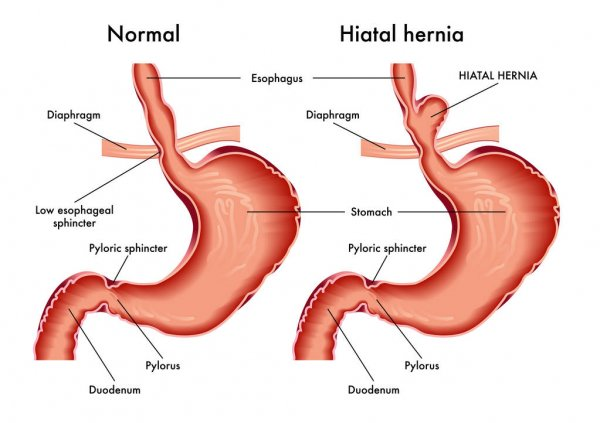
Acid reflux occurs when stomach acid irritates the lining of your esophagus. Continuous acid reflux that goes untreated often leads to pain or discomfort in the esophagus, and it can even cause more serious, long-term health conditions.
It’s helpful to be aware of the various conditions that can affect the esophagus.
These include achalasia, hiatal hernias, and Barrett’s esophagus.
Achalasia
Your esophagus is a tube in your throat that carries food from your mouth down into your stomach. At the end that attaches to the stomach, there is a small ring of muscle known as the lower esophageal sphincter (LES).
Under normal circumstances, the LES relaxes to allow food to pass into your stomach and tightens again to prevent stomach contents from rising into your esophagus. While acid reflux can occur if the LES is too loose, achalasia occurs when the LES is unable to fully relax and open when you swallow. This leads to food backing up into your esophagus, which in turn causes digestive issues and discomfort.
Achalasia is a fairly rare condition but can be quite disruptive for those who experience it. Common symptoms include chest pain after eating, heartburn, weight loss, regurgitation, and difficulty completing the swallowing process.
Causes of Achalasia
The most commonly observed cause of achalasia is an autoimmune condition, where your body begins mistakenly attacking healthy cells. This causes damage to the nerves in your esophagus or to the LES itself, which impairs its ability to function properly.
Achalasia may also be inherited genetically.
Treating Achalasia
Achalasia treatments typically involve improving the function of your LES. Doctors may suggest endoscopic therapy or surgery if other treatments do not resolve the issue.
Pneumatic dilation is a minimally invasive option where a balloon is inserted into the esophagus and expanded to dilate the LES. The expanded LES is better able to relax and open fully to allow food to pass through into your stomach.
If surgical measures are necessary, you may need an esophagomyotomy or a similar procedure known as a Heller myotomy. A surgeon will excise part of the LES, which will allow it to loosen properly.
Some gastrointestinal medications can provide relief from discomfort related to achalasia as well. Calcium channel blockers and nitrates promote relaxation of the LES. While these medications aren’t a permanent solution, they are still an invaluable option for people who don’t want or cannot get other treatments.
Hiatal Hernias
Your diaphragm is a dome-shaped muscle between your chest and your abdomen that assists with breathing. There is a small opening, known as the hiatus, that allows the esophagus to pass through the diaphragm.

If the muscles in this area grow weak, the top of your stomach may bulge through the hiatus. This is known as a hiatal hernia or a stomach hernia.
In many cases, you may not know you have a hiatal hernia for many months, as they usually aren’t dangerous and often do not cause any symptoms. When symptoms do occur, they are often mild, but they can include heartburn, trouble swallowing, chest pain, regurgitation, shortness of breath, and an unusually full feeling.
In some cases, larger hiatal hernias can cause gastrointestinal bleeding, which may be visible in vomit or stool. If you notice this, it is recommended that you see a doctor right away, as any gastrointestinal bleeding can be dangerous.
Causes of Hiatal Hernias
Weakened muscle tissues near the esophageal hiatus can increase your risk of hiatal hernias. This can be caused by intense or frequent pressure from vomiting, coughing, lifting heavy objects, and other actions that put strain on these muscles. Injuries and surgeries that impact this area can cause hiatal hernias as well.
Sometimes, hiatal hernias are a result of aging, as your hiatus muscles weaken as you get older. Obesity can also increase your risk of developing this condition.
Gastrointestinal Medicine and Treatments
Mild hiatal hernias often do not require any treatment. Still, they can cause discomfort, so you may choose to take antacids or other medications such as proton pump inhibitors and H2 blockers to alleviate heartburn and reduce acid production.
If the hiatal hernia is too large to be safe without intervention, surgery may be required.
Barrett’s Esophagus
Regular acid reflux may damage the esophagus over time, resulting in a condition known as Barrett’s esophagus.
Rarely, Barrett’s esophagus can lead to esophageal cancer, but your risk can be reduced if you employ various lifestyle changes to reduce acid reflux.
Acid Reflux and Gastrointestinal Health

Many people who experience heartburn make the mistake of ignoring the condition, writing it off as a minor nuisance. Unfortunately, when left unaddressed, gastrointestinal health issues and conditions like gastroesophageal reflux disease (GERD) can cause lasting damage to your esophagus.
Acid reflux occurs when stomach acid production is too high, or the LES grows too loose, allowing the acid to reach the esophagus. This causes temporary discomfort, but repeated exposure to acid can also wear down the esophagus over time and permanently change the tissue there.
Treating Barrett’s Esophagus
Barrett’s esophagus cannot be undone. However, you can prevent further damage to your esophagus by adjusting your eating habits and taking medication to reduce acid reflux.
Final Thoughts
It’s best to approach esophageal conditions like achalasia, hiatal hernias, and Barrett’s esophagus by promoting good gastrointestinal health. Follow healthy eating habits, avoid acid reflux triggers, and speak to your doctor if you notice any unusual pain or discomfort when swallowing food or liquid.
